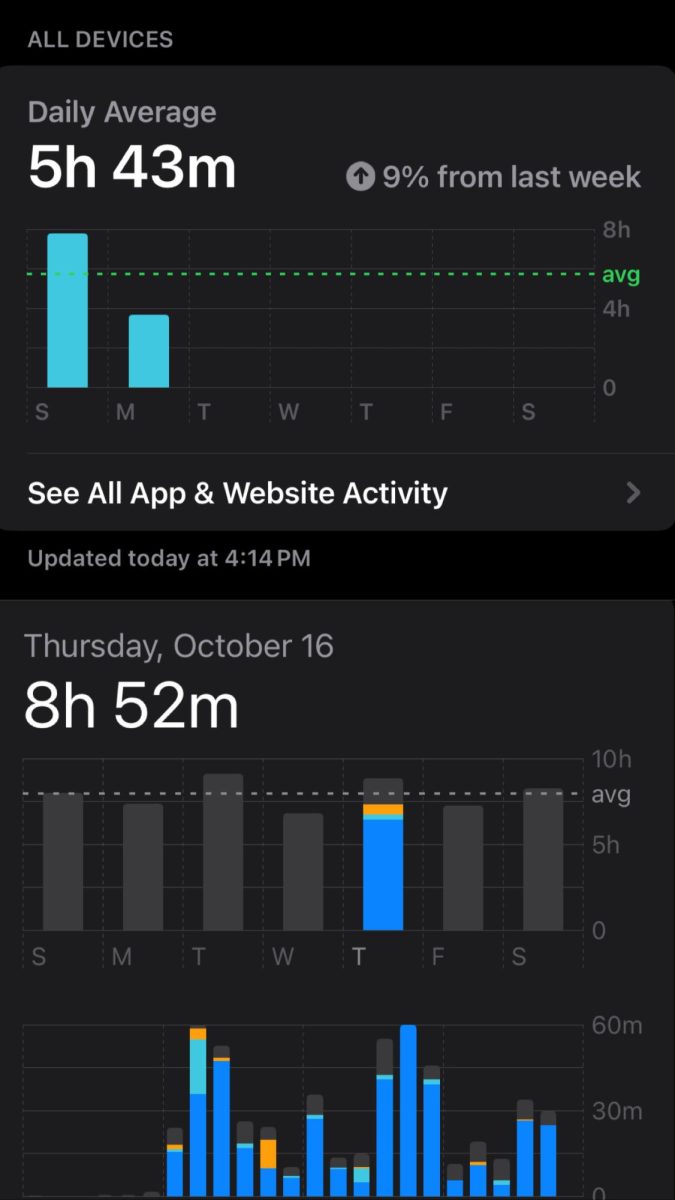As a Gen Z student and marketing major, social media has shaped my generation in every possible way. Platforms like TikTok, Instagram, YouTube, and Snapchat have created opportunities that once seemed impossible. Career paths that didn’t exist 10 years ago, have given us communities of all forms, and allowed passion and creativity to grow in ways earlier generations could only dream of.
But, somewhere along the way, that connection turned into comparison, adding pressure and stress to everyday life.
When I was in high school from 2018-2022, social media for me wasn’t just a pastime, it became my blueprint for life. I let it consume me and influence all aspects of my life. It became the driver when making decisions such as what clothes I wore, the sports I played, the college I chose, and even what I thought success should look like.
What started as a fun way to connect with friends gradually became a source of control. At the time, I didn’t fully realize it, but I was letting highlight reels and influencer posts dictate what was “acceptable,” “beautiful,” and “worthy.”
Now that I’m 21 years old and in college, I’ve begun to understand just how powerful, dangerous, and consuming social media can be.
For people like my parents, who grew up without social media, this constant struggle didn’t exist.
“We didn’t have all the answers at our fingertips or feel like we had a whole world to compare ourselves with,” said my mom, Jill Benson, who grew up as a teenager in the 1990s. “As teens, we weren’t existing or acting for likes and comments.”
I wanted to share her perspective as someone from a different generation. She grew up in an era when social pressures and daily life were based on what could be seen in the real world. If media influenced them, it came from television shows, commercials, magazines, and music videos.
Today, everything is recorded, and there’s a picture of nearly every moment in a teenager’s life. While pictures and memories are precious, social media has turned them into performance: “What picture can I take to get likes and look trendy to the public?”
“People didn’t record everything and post it for judgment,” my mom said. “If something dumb or even something great happened, it was talked about for a moment, then soon forgotten. It wouldn’t be seen on video by the whole school or the whole world and then exist forever on the internet, often taken out of context.”
Teens today are constantly worried about how their actions will be perceived. For Gen Z, personal happiness has increasingly become tied to likes, comments, and approval.
Still, these platforms do create opportunities, allowing careers based on content creation and media coverage.
“Social media has allowed me to find my passion and what I want to do for my career,” said Kylie Nicholson, University of Hawaii Athletics’ social media coordinator. “If it wasn’t for social media, I wouldn’t be doing what I love working in social media and marketing for UH Athletics.”
Social media is not all bad; it offers real opportunities and jobs but the mental strain it places on this generation is unimaginable for those who came before.
“As a 21-year-old, I understand the harm it can bring; however, there’s a lot of good that comes with social media that can outweigh the bad if used for the right reasons,” said Nicholson, who started working for UH Athletics as an intern but now has a career in social media marketing.
Social media has become the blueprint of Gen Z. It is so powerful in both a positive and negative way but also brings opportunities and jobs that wouldn’t be possible without it. The real question is are all the opportunities really worth all the stress and comparison that has taken over teens mind and perception.
